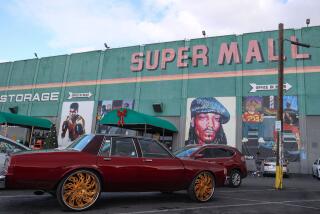As Some Reopen, Other Stores Caught in Red Tape : Recovery: Eight 7-Elevens lost in riots get back in business. Activists, however, point up the hardships that many Korean-American grocers face in rebuilding.
- Share via
As the eight 7-Eleven stores destroyed in last year’s riots reopened Thursday amid much fanfare, Korean-American grocers charged that they have received unfair treatment by the Los Angeles city government in their efforts to reopen.
Jerry Yu, executive director of the Korean American Coalition, said that although the Korean-American community applauded the stores’ reopening, only three of 58 Korean convenience store owners have been able to surmount the city’s bureaucratic hurdles and get back in business.
Yu’s announcement came at a news conference held Thursday to coincide with the reopening ceremonies organized by the 7-Eleven stores’ parent company, Southland Corp.
That event featured performances by multicultural entertainers, a ribbon-cutting ceremony and a dedication attended by Los Angeles City Council President John Ferraro and representatives of Southland Corp. and Rebuild L.A., known as RLA.
The Southland Corp. worked hand in hand with RLA in finding local contractors to rebuild the burned-out stores, said Cecilia Stubbs, the company’s vice president of communications.
Few independent Korean businesses, however, have been able to come back, Yu said, because they are being held to tougher standards than existing businesses. These new provisions were partly the result of a strong lobbying effort against the reopening of liquor stores in riot-hit areas. The new regulations affect convenience stores that sold beer and wine or held liquor licenses. Also classified as “controversial” businesses that must undergo Planning Commission review are gun stores, swap meet-type shops, pawnshops and auto parts stores.
“Controversial” businesses seeking to rebuild may have to comply with certain new stipulations, including limits on the stores’ hours of operation, provisions for adequate parking, removal of graffiti and hiring of security guards, Yu said.
“Security guards can cost around $12 per hour,” said shop-owner Soo Chan Cha, whose store burned on the second day of the riots. “That’s between $7,000 and $8,000 a month.”
“That’s an extraordinary cost for them,” said Erik Chang, the coalition’s program director. He added that many of the shop owners make only about $2,000 in profit a month.
Frank Eberhard, deputy director of the Planning Commission, defended the permit process. “Each decision is made case by case based on the information given before the Planning Commission. . . . Judgments are based on the information presented to the commission by the Police Department, community groups and the owners,” he said.
But unlike the 7-Eleven stores, whose property, buildings and equipment are owned by Southland Corp.--the individual owners work as independent contractors who franchise the business--many Korean-American businesses cannot afford many of the changes the commission seeks. In addition, many Korean business owners do not speak English well, are unfamiliar with the hearing process and lack political connections in City Hall to help cut bureaucratic red tape.
Cha’s store was destroyed just 10 months after he had bought it. His difficulties in rebuilding his store were made more complex when he discovered that the city had rezoned the neighborhood from commercial to residential the year before he moved in. Now the city wants him to build a three-unit apartment on his lot.
“I can’t do that. How am I going to pay back my bank loan?” Cha said, adding that he had borrowed $300,000 in 1991 to purchase the store.
At the ribbon cutting for a 7-Eleven store in Koreatown, Ferraro said he was unaware of the problems the Korean-Americans are facing. “I represent a part of the Korean community, as does Nate Holden, and we’re very supportive of the Korean community and I know we would have helped if they called us,” Ferraro said.
“The City Council went on record in saying it would eliminate red tape and help with the rebuilding,” he said. “I don’t understand why there has been a delay.”
But Yu said the Planning Commission and City Council were aware of community concerns.
“Before, during and after (the ordinance was passed), we testified and gave written testimony of the grievances of small business owners,” Yu said. “So it’s pretty amazing to us that Councilman Ferraro could say he wasn’t aware.”
More to Read
Sign up for Essential California
The most important California stories and recommendations in your inbox every morning.
You may occasionally receive promotional content from the Los Angeles Times.













